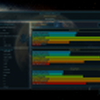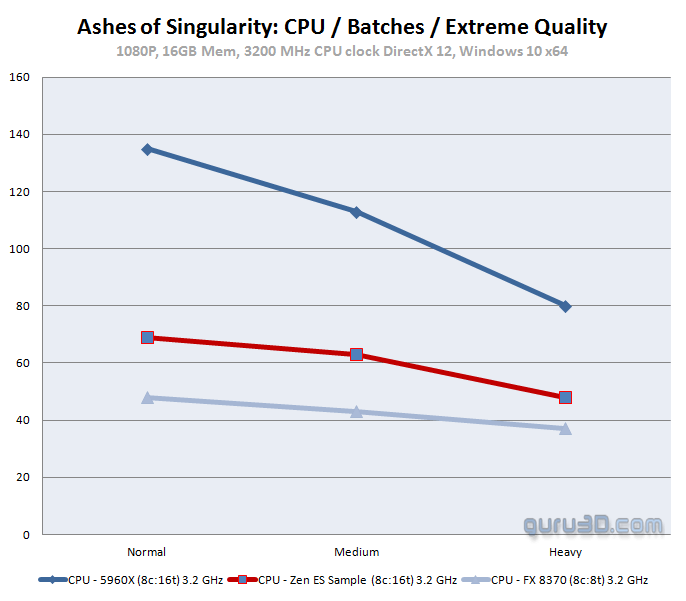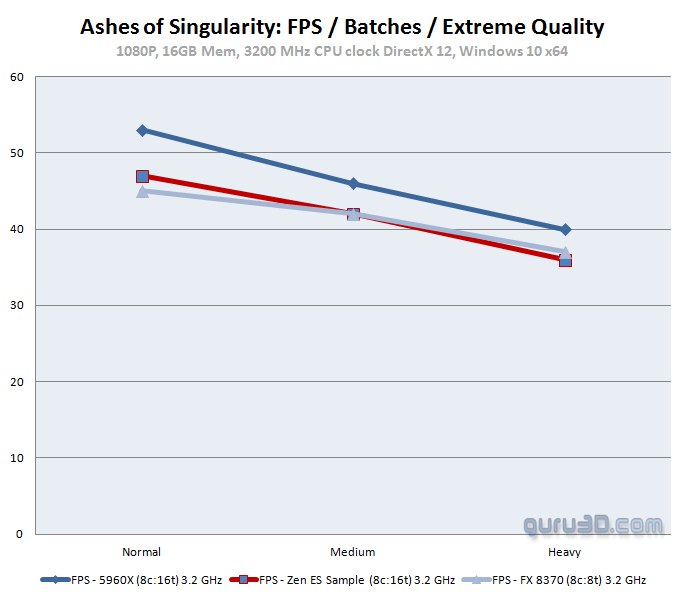In this news-item we'll look a little deeper into the benchmark performance of AMD Zen and Ashes of Singularity. After the some results leaked yesterday a lot of questions have been raised.
So, first things first. Yesterday results of AMD Zen processors (engineering samples) leaked onto the web. The colleagues from wccftech who discovered this find, posted a couple of benchmarks that have been publicly accessible on the Ashes of the Singularity-benchmark database. Shortly after Wccftech posted them, the results have been removed, however the guys made screen-shots indicating the results from two different SKUs, e.g. 1D2801A2M88E4_32/28_N. The last parts (in bold) represent the clock and turbo frequency. Engineering samples always run at much lower clocks for preliminary testing purposes, though difficult to judge that does make the results quite interesting. In our forums (and throughout the web) a discussion started about the possible performance of the Zen generation. Fact remains, slow clocked ES CPU's are just that, engineering samples. A test done with a test run on one benchmark on likely an un-optimized platform with word that even in DX12 mode this benchmark only properly utilizes four threads? 3200/2800 MHz - now it could very well be that the final flagship SKUs will clock 4.0~4.4 GHz (I honestly do not know), until actually released and tested you guys should take this news as the title states, promising. Other then that you hardly can draw any conclusions at this time. Last night, a valid question posted in our forums got stuck in my mind, downclock an 8-core Core i7 5960X towards 3200 MHz (matching the maximum Boost frequency of that Zen processor), and you could/would/maybe see the a performance differential that matches up more closely with Zen that also has 8 cores / 16 threads. So that was a very valid suggestion/question.
So this morning I decided to do pursue that remark, I used the benchmark results from the colleagues at wccftech and then setup two test systems. The first is the Core i7 5960X. This processor has 8 cores and sixteen threads, this matches the Zen "Summit Ridge" processor in cores and threads. You could argue that you cannot a 1000 USD processor towards an AMD Zen product, but again it matches the cores and threads. Also per core an Intel processor in the high end range is roughly equally fast aside from the effect of its clock frequency. E.g. a Core i7 4790K core is roughly as fast as a Core i7 5960X core if you clock them at the same frequency. So when you downclock processors, the becore very similar in per core performance (Intel CPU wise). Next to that I grabbed an AMD setup and inserted an AMD FX 8370 which has 8 cores.
We then down-clocked the AMD and Intel processors towards 3200 MHz. So now we have three processors pretty much in equilibrium frequency range running at (give or take) that 3200 MHz. We now need to match up other stuff:
- We gave both systems 16 GB of memory (Core i7 runs in quad-channel though).
- We installed a Radeon RX 480 with the latest driver (16.8.1) to match up the leaked setup.
- We updated Ashes of Singularity (1.30.21168.0) towards precisely the same build as the leak.
- We mimicked the quality modes in DirectX 12, the Zen results leaker merely used the Low, standard, High and Extreme switches.
- After each quality settings change we restarted the game.
And all that gives us a result set of the current state of the engineering sample versus the Core i7 5960X and AMD FX 8370. Now before we dive into the results, I do want to mention that these benchmarks should be considered as subjective, maybe even a little shoddy. The AMD Zen results are based on a leak, used in likely a highly un-optimized platform and as such I do expect the final retail SKUs to be much much faster.
So take the results with a grain of salt as there is little actual final with engineering sample processors, and just wait until the processors reach the market later this year with proper benchmarks and testing, and not just one AOS results set. Also we need to place at least a bit of suspicion to the actual source (not wccftech) but the actual person that injected the results into the AOS database. They could even be faked, albeit the likely-hood of that, we feel, is slim. Still we cannot rule it out of course. Okay, I think I shared enough disclaimers and concerns right ? We ran the Ashes of Singularity benchmark in four stress test modes at 1080P, similar towards the leaked results. There are some oddities in there alright, but have a peek. CPU results first, followed by rendered frames per second:
And there you have it, preliminary results compared towards two processors at the same clock frequency. This is an indication, the results however should be taken with a grain of salt as we know little about these Zen ES samples and how they have been configured and at what status the AMD test platform is. The Core i7 5960X on X99 obviously is a highly optimized platform anno 2016.
You should not and cannot draw any final conclusions based on just this set of tests.
AMD ZEN Engineering Sample AOS - Further Performance Analysis











